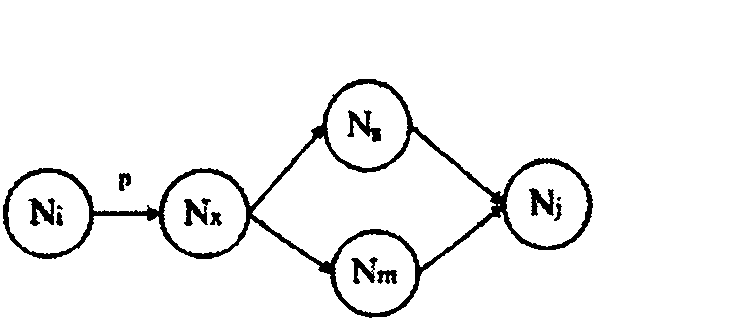Trust model-based cooperative communication method in mobile self-organized network
A mobile self-organization and trust model technology, applied in wireless communication, network topology, network planning, etc., can solve problems such as battery exhaustion, false recommendation iterative convergence, node interaction failure, etc.
- Summary
- Abstract
- Description
- Claims
- Application Information
AI Technical Summary
Problems solved by technology
Method used
Image
Examples
Embodiment Construction
[0097] Conversion rule of trust degree based on topological transformation
[0098] Suppose in image 3 Calculate N in the network i To N j The trust of N n And N m Two routes. According to the trust conversion method of definition 5, the node N x Copy into two, so that the original topology is converted to a parallel topology, such as Figure 4 Shown. Last N i To N j The total recommendation trust can be based on figure 1 with figure 2 Method of calculation.
[0099] Calculation method of recommendation trust degree based on topological transformation
[0100] Here we are Figure 5 Take an example to illustrate this calculation method. Assuming R 1,3 H , After deleting path "13", the parallel topology is as Image 6 Shown.
[0101] From Image 6 Known in N total Is 3, so set cons to 10. According to equation (8), It should be [1 / 3×10] / 10=0.4. Can be seen here The error is large. In theory, the more nodes there are (the larger the network scale), The higher the accuracy. I...
PUM
 Login to View More
Login to View More Abstract
Description
Claims
Application Information
 Login to View More
Login to View More - R&D
- Intellectual Property
- Life Sciences
- Materials
- Tech Scout
- Unparalleled Data Quality
- Higher Quality Content
- 60% Fewer Hallucinations
Browse by: Latest US Patents, China's latest patents, Technical Efficacy Thesaurus, Application Domain, Technology Topic, Popular Technical Reports.
© 2025 PatSnap. All rights reserved.Legal|Privacy policy|Modern Slavery Act Transparency Statement|Sitemap|About US| Contact US: help@patsnap.com



